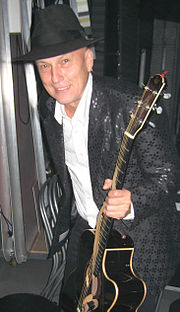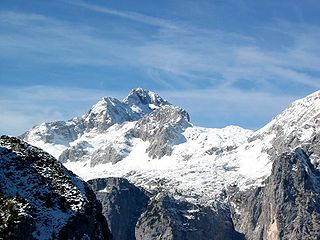
Triglav, with an elevation of 2,863.65 metres (9,395.2 ft), is the highest mountain in Slovenia and the highest peak of the Julian Alps. The mountain is the pre-eminent symbol of the Slovene nation. It is the centrepiece of Triglav National Park, Slovenia's only national park. Triglav was also the highest peak in Yugoslavia before Slovenia's independence in 1991.
In the minds of many foreigners, Slovenian folk music means a form of polka that is still popular today, especially among expatriates and their descendants. However, there are many styles of Slovenian folk music beyond polka and waltz. Kolo, lender, štajeriš, mafrine and šaltin are a few of the traditional music styles and dances.

Siddharta is a five-piece Slovenian alternative rock band formed in 1995. They are named after the 1922 novel by the German writer Hermann Hesse, Siddhartha.

Pankrti are a punk rock band from Ljubljana, Slovenia, active in the late 1970s and 1980s. They were known for provocative and political songs. They billed themselves as The First Punk Band Behind The Iron Curtain. They are one of the most important former Yugoslav punk groups and one of the first punk rock bands ever formed in a communist country.

Oton Župančič was a Slovene poet, translator, and playwright. He is regarded, alongside Ivan Cankar, Dragotin Kette and Josip Murn, as the beginner of modernism in Slovene literature. In the period following World War I, Župančič was frequently regarded as the greatest Slovenian poet after Prešeren, but in the last forty years his influence has been declining and his poetry has lost much of its initial appeal.

Založba kaset in plošč RTV Slovenija or Založba kaset in plošč Radiotelevizije Slovenija is a major Slovenian record label, based in Ljubljana. It was founded under the name Založba kaset in plošč RTV Ljubljana and renamed in 1990. It is the music production branch of the national broadcaster Radiotelevizija Slovenija.
Among the modes of expression of the culture of Slovenia, a nation-state in Central Europe, are music and dance, literature, visual arts, film, and theatre. A number of festivals take place, showcasing music and literature.

Edvard Kocbek was a Slovenian poet, writer, essayist, translator, member of Christian Socialists in the Liberation Front of the Slovene Nation and Slovene Partisans. He is considered one of the best authors who have written in Slovene, and one of the best Slovene poets after Prešeren. His political role during and after World War II made him one of the most controversial figures in Slovenia in the 20th century.

Dragotin Kette was a Slovene Impressionist and Neo-Romantic poet. Together with Josip Murn, Ivan Cankar, and Oton Župančič, he is considered the founder of modernism in Slovene literature.

Založba kaset in plošč RTV Ljubljana or Založba kaset in plošč Radiotelevizije Ljubljana, was a major record label in the former SFR Yugoslavia, based Ljubljana, Socialist Republic of Slovenia. In 1990, at the start of the breakup of Yugoslavia, the name of the company was changed to Založba kaset in plošč RTV Slovenija. It was and still remains a leading publishing firm in Slovenia.

Janez Menart was a Slovene poet, best known for his Intimist poetry. He translated a number of classic French and English poetry and drama works into Slovene, including Shakespeare's sonnets.
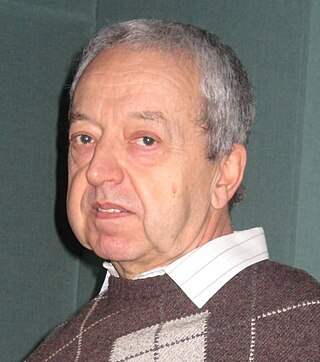
Jani Golob is a Slovenian composer, violinist, arranger and professor.

Lojze Grozde was a Slovenian student who was murdered by Partisans during World War II. His death is recognised as martyrdom by the Catholic Church. He was beatified on 13 June 2010.
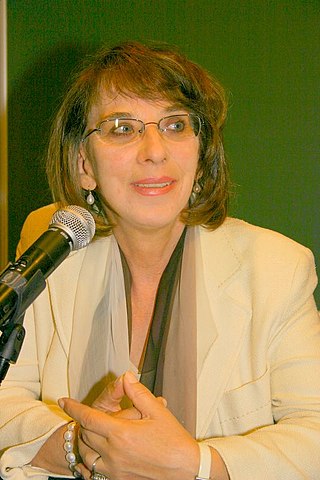
Svetlana Makarovič is a Slovenian writer of prose, poetry, children's books, and picture books, and is also an actress, illustrator and chanteuse. She has been called "The First Lady of Slovenian poetry." She is also noted for borrowing from Slovenian folklore to tell stories of rebellious and independent women. She is well-known adult and youth author. Her works for youth have become a part of modern classic and youth canon, which both hold a special place in history of the Slovenian youth literature. She won the Levstik Award for Lifetime Achievement in 2011.

Andrej Rozman is a Slovene poet, writer, actor, and street theatre producer. He writes poems and creates plays for children and also writes satirical poetry for adults.
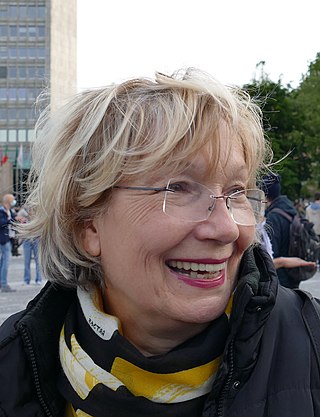
Alenka Sottler is a Slovene painter and illustrator. She lives and works in Ljubljana as a freelance illustrator and is a member of New York Society of Illustrators. She has illustrated over 50 books for children and adults, for which she received numerous awards and honours including her second nomination for the Hans Christian Andersen Award in 2014.
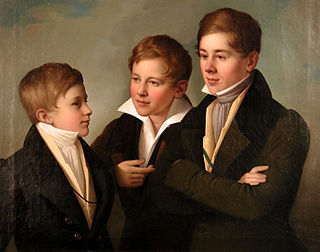
Art of Slovenia refers to all forms of visual art in or associated with Slovenia, both before and after the country's Independence from Yugoslavia in 1991. Art in Slovenia has been shaped by a number of Slovenian painters, sculptors, architects, photographers, graphics artists, comics, illustration, and conceptual artists. The most prestigious institutions exhibiting works of Slovene visual artists are the National Gallery of Slovenia and the Museum of Modern Art in Ljubljana.
Jana Kolarič is a Slovene author and translator. She is the author of plays and novels for both children and adults, and has been recognised as an exceptional artist by the Ministry of Culture. She has won a number of literary awards.
Ada Škerl was a Slovene poet, writer and translator from French.

Beletrina Academic Press is a Slovenian publishing house, originally founded in 1996 by students of the University of Ljubljana as the Študentska Založba. Co-founders include notable Slovene authors such as Aleš Šteger and Mitja Cander. It has operated the Beletrina Bookshop, which opened in Ljubljana in 2010, since 2014. In addition to physical books, it also publishes the online magazines AirBeletrina and Versopolis, and hosts two literary festivals, Days of Poetry and Wine Festival and Fabula Festival, since 2004. Through the AirBeletrina literary journal, it hosts a short-story contest; the publishing house also organizes creative writing courses. In 2013, Beletrina launched Biblos.si, the first Slovene eLibrary and eBookshop. Beletrina also issues recordings of authors reading from their own work. As a non-profit publisher, it receives funding from the Slovenian government with an aim to "foster a literary atmosphere throughout Slovenia". Beletrina also receives subsidies from the European Union, the Slovene Public Agency for Books (JAK), and different ministries of culture in Slovenia.

